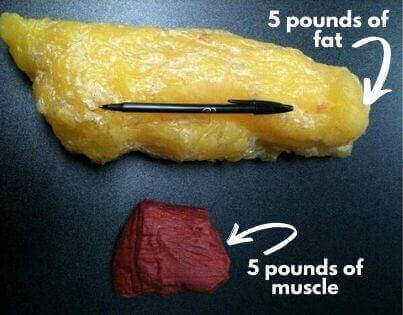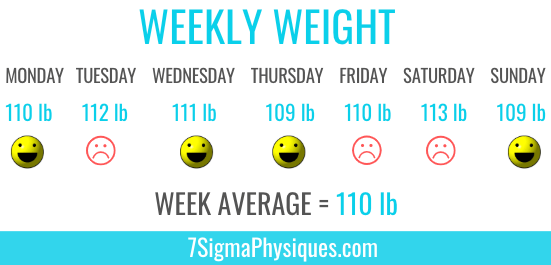When losing weight, it’s easy to give all of our attention to the number on the scale, however, weight loss is much more than just that number.
Body scales measure your weight, which includes water, fat, muscle, clothes, and undigested food. Therefore, it is completely normal to lose inches, but not weight.
Here’s what we’ll cover in this article:
Table of Contents
Why Am I Losing Inches But Not Weight?
1. Building Muscle
Yes, you can build muscle while losing weight, however, this only applies to the following people:
- overweight or obese individuals who are doing resistance training,
- people who are in their first year of doing resistance training (consistently),
- people who started resistance training again after taking some time off, and
- athletes using performance-enhancing drugs.
In most cases, someone who loses inches but not weight will fall into this category, which should be a good thing.
The reason you are losing inches but not weight is that muscle takes up less space than an equal amount (in weight) of fat.

People often refer to this process as “body recomposition.” Two people with the same height and weight could look completely different.
This is a common reason why you might be getting thinner but not losing weight.
Here are 4 ways to prevent losing muscle during weight loss.
2. Hormonal Changes
This is more common in women.
Your reproductive hormones can affect how much water you’re retaining, which can cause your weight to fluctuate during your monthly cycle.
This is why I recommend weighing yourself at least 4 times a week first thing in the morning, and comparing weekly averages.
Once you have this information, you’ll be able to see how your weight tends to increase during your cycle and then comes back to normal, which will give you peace of mind.
I want to point out that other things can also affect your weight, so don’t panic if one day you wake up 3-5 pounds heavier.
Again, that’s why I recommend weighing yourself at least 4 times a week and comparing weekly averages instead of day to day.

3. Inflammation
It’s important to remember that we are all different.
This means that our bodies might react differently to different foods. For instance, some are allergic to shrimp, others lactose intolerant, and some others can eat anything.
Eating foods that your body can’t process well can lead to bloating, which can make you retain water and leave you feeling tired.
Here’s a more in-depth article on how inflammation can slow weight loss.
Finding Which Food is Causing Issues
If you think you’re dealing with inflammation and bloating, you can find which food is causing it by using the method of elimination.
Basically, you’d want to eat the same meals every day for a week and then eliminate one food the following week, evaluate how you feel, and repeat until you’ve found the food causing the issue.
To make the process easier, you can use a free app like MyFitnessPal to keep track of your foods.
If you don’t know how to use MyFitnessPal, you can check out my guide on how to use it.
4. Water Retention from Medications
Medications tend to have quite a bit of side effects, with one of the most common ones being water retention.
This is especially true for anti-inflammatory meds, such as aspirin and ibuprofen, beta-blockers, and birth control pills.
Is Losing Inches Better Than Losing Weight?
Whether losing inches is better than losing weight depends on your goals.
If your goal is to burn fat and maintain a toned body, then yes, it might be better.
In this case, losing fat but not weight could mean that you’re building muscle, which will help you have a fit look and boost your metabolism.
How Many Pounds Do You Have to Lose to Lose an Inch?
The number of pounds you have to lose to lose an inch is somewhat difficult to measure.
The more weight you currently have, the more pounds you have to lose to reduce your waist size.
Most people seem to be able to lose 1 inch for every 5-8 pounds.
Weight Gain Before Weight Loss
It is also possible to gain weight before weight loss.
This often happens if you’re just starting to exercise.
As mentioned above, exercising will cause micro-tears on your muscle fibers, which will cause some inflammation.
Your body’s response to the micro-tears and inflammation will cause some temporary water weight gain. (1)
You could also experience some muscle soreness for the next 24-36 hours after exercising.
Don’t Focus Too Much on the Scale
While the scale can be a good tool to track progress, it is by no means the most reliable one.
As previously mentioned, your weight can fluctuate on a daily basis. so Instead of relying only on what the scale shows, you may want to add the following:
- Take weekly progress photos first thing in the morning and under the same lighting and at the same distance.
- Take weekly measurements of your waist, quadriceps, biceps, and chest.
So don’t drive yourself crazy by thinking you must hit a certain goal weight.
Compare your weekly pictures, see how your clothes are fitting, and focus on getting healthier and happier.
I hope you loved this article on why you’re losing inches but not weight!